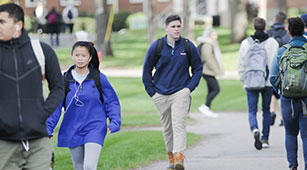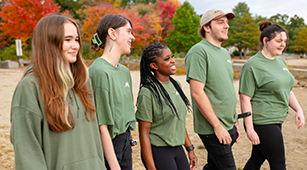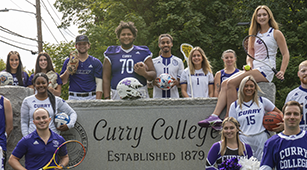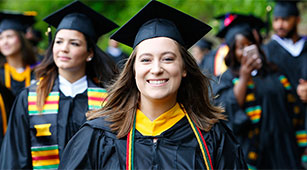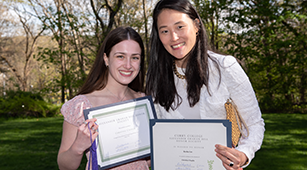Schedule an appointment to meet with Career & Experiential Learning about your area of interest.
Make an AppointmentContact Admission
- 617-333-2210
- adm@curry.edu
- 1000 Brush Hill Rd.

Spend Your Year-Off, as a Year-On at Curry
Have you decided to defer your college start by taking a year or semester off to pursue other options? Curry is excited to introduce our Year-On Program as a way to spend your Year-Off! Year-On is an online program for students who choose to defer their full time matriculation at the College for a semester or full academic year. Students who choose to spend a Year-On with Curry will have the option of taking three online courses over a semester, to earn a maximum of 10 credits.
Participating in the Year-On Program will have no impact on your admission to the College if you have already been admitted. You can choose to begin full-time when you are ready without any impact to scholarships you may have been awarded. Whether you have decided on a major to pursue or if you are undecided, the Year-On Program is a great way to stay academically engaged with Curry while getting a jump-start on your undergraduate degree program.
*Students admitted to Nursing will be required to defer for a full academic year with an anticipated start in Fall.
Program Costs
- Full program cost (3 courses, 3 credits for a total of 9 credits) is $3,375*
- Per course cost (standard 3 credit course) is $1,125*
- Per credit cost is $375
*additional fees such as books may be applicable
Please also note:
- Students admitted to the Program for Advancement of Learning (PAL) will also have the option of receiving PAL support throughout the Year-On Program for an additional fee of $3,570.
- Financial aid is not available for the Year-On Program
- Program must be paid in full by the start of the term
Program Dates
Winter Term 1: December 7, 2020 to December 28, 2020
Winter Term 2: December 7, 2020 to January 24, 2021
Winter Term 3: January 5, 2021 to January 24, 2021
Spring Term 1: January 25, 2021 to March 20, 2021
Spring Term 2: March 22, 2021 to May 15, 2021
PLEASE NOTE: All courses listed below are 3 credits unless specified...
Winter Term 1 Courses
December 7 - 28, 2020:
CRW 2300: Creative Writing I
Explores in theory and practice the nature, value and the techniques of prose and poetry writing. This course meets the General Education Arts Breadth and Reading/Writing Enhancement requirements. Prerequisite: Six (6) credits of Writing/English at the 1000-level.
PRS 2230: Philosophy of Popular Culture
An investigation of contemporary values and philosophic issues expressed through selected forms of contemporary art and life style, including science fiction, pop music, film, video, consumer culture, etc. What is “pop” culture? What attitudes toward being human are expressed and marketed in popular culture today? What concepts and perspectives on human community and the cosmos are operative in “pop” culture? What tools does philosophy offer to critique contemporary culture? This course will offer opportunities for intergenerational dialogue and philosophic assessment of the values implicit in “pop” culture. This course meets the General Education Humanities Breadth requirement and may be Reading/Writing enhanced.
SOC 1100: Sociology of Popular Culture
This course examines the social significance of popular culture historically and in the contemporary era. Topic covered include theories of popular culture. Distinctions between “high” and “low” culture, domination and resistance in popular culture, the effect of mass culture on contemporary society, fan cultures, and “textual poaching.” In our examination of popular culture we will also learn about sociological theories and concepts. This course meets the General Education Social Science Breadth and Information Literacy Enhancement requirements.
AC 1030: Communication Technology
A foundation course combining communication and technology history, theory and practice. Covers the basics of utilizing and assessing a variety of digital resources. Students acquire and apply the communication skills and technologies that are integral to academic and career success. New and emerging communication technologies that aid in developing communication skills, such as persuasion and communication delivery to varied audiences, will be discussed. This course meets the General Education First Year Core Communication requirement.
AC 2050: The Art of Creating Online Content
This course integrates Graphic Design and Web Design theories and processes. Three primary areas of creating an online presence will be discussed: Graphic (Visual) Design, Content Creation and Technology Tools. The process of Online Design will be discussed from an artist, user (viewer) and technical perspective. Students will create a website using effective Visual Design theories such as: color, balance, proximity, graphics, and layout as well as ADA compliance. Students will also create content that complies with web writing style and image standards that will target the specific needs of a specific audience. The resulting content and design will be published using an online web editor. The semester project will be an appropriate inclusion in the e-portfolio. This course meets the General Education Arts Breadth and Reading/Writing Enhanced requirements.
BUS 1610: Macroeconomics
Fall and Spring Semesters The study of economic analysis in theory and practice. The structure and determinants of a nation’s income, employment, investment, and balanced growth. Required for Business Administration majors and minors. This course meets the General Education Social Science Breadth and Quantitative Literacy Enhancement requirements. Prerequisite: Math Assessment.
GEN 1000: First Year Inquiry
This course introduces students to thinking in the liberal arts through examination of topical, relevant, real-world issues through a focused disciplinary and broader interdisciplinary perspective. Using common readings, speakers, and information drawn from liberal arts disciplines, students will explore their own ideas and assumptions while discussing ways in which information drawn from the liberal arts offers deeper understanding and insight into their lived experiences – personal or educational. Additionally, throughout the course, information literacy and portfolio development will be introduced as students retrieve and evaluate information, and demonstrate their learning.
MATH 1150: Statistics
Explores the collection, organization, analysis, and inference of data in multiple contexts through statistical methods. Requires students to discuss quantitative results, interpret multiple representations (symbolic, graphical, numerical, verbal) of quantitative information, and solve problems using quantitative methods, particularly linear regression and correla- tion, the construction of confidence intervals, and tests of hypotheses. This course meets the General Education First Year Core Quantitative Literacy requirement. Prerequisite: Successful completion of MATH 1000 or demonstrated proficiency on the Mathematics Assessment.
Winter Term 2 Courses
December 7, 2020 - January 24, 2021:
SA 1800: Drawing
Introduces drawing techniques and explores the particular quality and expressiveness of a variety of drawing media — pencil, ink, charcoal, and conte crayon. Students practice drawing skills with emphasis on compositional principles and the development of visual sensitivity. Students are expected to purchase supplies. This course meets the General Education Arts Breadth requirement.
WRIT 1400: Reading, Writing, Research I
This course serves as an introduction to the kinds of reading and writing students will be expected to do in college. Emphasis on the developing confidence as writers, especially students’ identities as writers through practice and reflection. This course will present strategies for critical reading, purposeful revision, and reflection. This course meets the General Education First Year Core requirement. Prerequisite: Successful completion of WRIT 1060 or demonstrated proficiency on the Writing Assessment.
WRIT 1500: Reading, Writing, Research II
Advancing concepts introduced in WRIT 1400, this course focuses on research writing at the college level. Emphasis will be placed on developing a sound research process from inquiry to final product using strategies for applying research methods in order to locate, critically read, evaluate, and incorporate texts. Focus will be on presenting research in a comprehensive research writing project using appropriate rhetorical conventions. This course meets the General Education First Year Core requirement. Prerequisite: WRIT 1400 or equivalent course experience.
Winter Term 3 Courses
January 5 - 24, 2021:
CRW 2300: Creative Writing I
Engages students in writing poetry and includes extensive in class discussion of the students’ own poems and proposed methods of revision. Experimental forms are included, as well as work in more traditional forms. This course meets the General Education Arts Breadth and Reading/Writing Enhancement requirements.Prerequisite: Six (6) credits of Writing/English at the 1000-level or permission of instructor.
HW 1000: Personal Health
This course will introduce the student to all the major areas of health and how they affect their lives. Health promotion, wellness and empowerment will be discussed and analyzed in relation to each health component. Upon completion of this course, students will have a better understanding of the importance their personal decisions make on their health. This course meets the General Education Wellness requirement.
PRS 2210: Ethics
Ethics is the study of human and humane activity, an inquiry into the determination of the will. This course examines major theories that describe and set norms for forming moral judgments. Questions raised will include: Are humans inherently selfish? How does one decide the correct path–by predicting the consequences of actions or by examining the actions themselves? A portion of the course is devoted to recent developments in virtue theory, and ancient tradition that examines the intentions of the moral agent rather than consequences or acts. This course meets the General Education Humanities Breadth requirement and may be Reading/Writing enhanced.
PRS 2510: Introduction to New Testament
A study of the various writings included in the New Testament in light of their historical and cultural settings. Gives attention to their literary, theological, and socio-political aspects in an attempt to relate early Christian religious perspectives to human experience in both the ancient and the modern world. This course is recommended for students with sophomore standing or above. This course meets the General Education Humanities Breadth requirement and may be Reading/Writing enhanced.
SOC 1000: Introduction to Sociology
This course serves as an introduction to the discipline of Sociology. Sociology is the study of human interaction and society. This includes both the power of individual actors and larger structures within society. Often times we may understand our decisions and actions to be entirely and exclusively our own, when in fact they are the complicated product of the interaction between ourselves and the institutions and structures of our society. In this course, we will begin to understand the interaction between society and the individual, and how sociologists study and explain social phenomena. Key concepts introduced include: culture, groups, socialization, social interaction, institutions, and inequality. This course meets the General Education Social Science Breadth and Information Literacy Enhancement requirements. Not open to students who have taken SOC 1000: Perspectives on Society and Culture or SOC 1000: Social Life.
Spring Term 1 Courses
January 25 - March 20, 2021:
BIOL 1075: Anatomy and Physiology I
The first semester of a two semester introductory course in human anatomy and physiology. Topics covered this semester include cell biology, histology, and the structure and function of the integumentary, skeletal, muscular, and nervous systems.
BIOL 1175: Anatomy and Physiology I Lab (1 credit)
Introduces students to the laboratory techniques involved in the practical examination of the topics presented in A&P I lectures. Techniques involve microscopy, dissection and experimentation. Fee.
MATH 1150: Statistics I
Explores the collection, organization, analysis, and inference of data in multiple contexts through statistical methods. Requires students to discuss quantitative results, interpret multiple representations (symbolic, graphical, numerical, verbal) of quantitative information, and solve problems using quantitative methods, particularly linear regression and correla- tion, the construction of confidence intervals, and tests of hypotheses. This course meets the General Education First Year Core Quantitative Literacy requirement. Prerequisite: Successful completion of MATH 1000 or demonstrated proficiency on the Mathematics Assessment.
PE 1217: The Science of Weight Management
This course will focus on the relationship between food as caloric intake and exercise as energy output. The successful student will examine dietary intake, engage in behavior analysis, participate in various forms of exercise, and create an individualized and effective weight management action plan. This course is designed for individuals who wish to gain an understanding of, and develop strategies for, their personal weight management. This course is also ideal for future health educators to develop the knowledge and strategies for guiding those with sedentary lifestyles and/or unhealthy eating habits. This course meets the General Education Wellness requirement.
PRS 2541: Race and Religion in America
The class explores some of the characteristics of African religions; slave religion, slave narratives, and their role in slave rebellions; the central role of religion in the African American community throughout American history; the role of religion in the context of the Atlanta Compromise, Booker T, Washington vs. W.E.B. DuBois; the roles of key people such as Absalom Jones, Richard Allen, Denmark Vesey, Nat Turner, Frederick Douglass, Sojourner Truth, Marcus Garvey, Elijah Muhammad, Howard Thurman, Martin Luther King, Jr., Malcolm X, Louis Farrakhan, Jesse Jackson, James H. Cone, “womanist” thinkers writers/ theologians like Delores Williams and Emilie Townes, etc. A special focus of the course will be on the role of the black church in the struggle for civil rights, highlighting the complex relationship between Malcolm X and Martin Luther King, Jr. The role of religion in the contemporary African American community(ies) will also be examined. The relationship between African American religion(s), not existing in isolation, and the dominant white society will also be explored throughout the course. This course meets the General Education Humanities Breadth requirement and Information Literacy Enhancement requirements.
PSY 2070: Motivation
The study of how internal psychological processes interact with the social context to influence human behavior. Particular attention is given to sexual and aggressive motives, biological factors, cognition, and the role of expectation in guiding human behavior. Prerequisite: PSY 1030.
Spring Term 2 Courses
March 22 to May 15, 2021:
BIOL 1085: Anatomy and Physiology II
The second semester of an introductory course in human anatomy and physiology. We will study several of the major organ systems of the human body, including the digestive, respiratory, cardiovascular, urinary, reproductive, and endocrine systems.
BIOL 1185: Anatomy and Physiology II Lab (1 credit)
Introduces students to the laboratory techniques involved in the practical examination of the systems studied in A&P II lectures. Techniques involve dissection and experimentation. Fee.
COM 2100: Managerial Communication
Students will be introduced to the theoretical and practical principles of organizational structure, culture and management in relationship to all aspects of communication skills. Students will explore various organizations and will participate in managerial case studies virtually and face to face. Students will be introduced to motivational concepts and communication skills necessary to become more effective managers and leaders. Students will manage and be managed by peers for individual, team, and class assignments. Prerequisite: COM 1010 or sophomore standing.
CRW 2300: Creative Writing I
Explores in theory and practice the nature, value and the techniques of prose and poetry writing. This course meets the General Education Arts Breadth and Reading/Writing Enhancement requirements. Prerequisite: Six (6) credits of Writing/English at the 1000-level.
MATH 1150: Statistics I
Explores the collection, organization, analysis, and inference of data in multiple contexts through statistical methods. Requires students to discuss quantitative results, interpret multiple representations (symbolic, graphical, numerical, verbal) of quantitative information, and solve problems using quantitative methods, particularly linear regression and correla- tion, the construction of confidence intervals, and tests of hypotheses. This course meets the General Education First Year Core Quantitative Literacy requirement. Prerequisite: Successful completion of MATH 1000 or demonstrated proficiency on the Mathematics Assessment.
PE 1140: Living a Heart Healthy Life (1 credit)
This course invites a purposeful and activity-driven approach to the role of cardiac health as it supports a healthy lifestyle. Included is a functional knowledge of the cardio-respiratory and muscular-skeletal systems and assessment of cardiac response to pre/during/post exercise, progress monitoring and designing a heart-healthy regime. Students will be participating in physical activity-based experiences. This course meets the General Education Wellness requirement.
P&H 2400: The Politics of Deception
Examines the use of deception by recent national administrations as well as the use of deception in political campaigns. The impact of the Watergate scandal is considered and whether the lessons of Watergate are adequate to prevent future scandals. The role of the FBI and the CIA are examined including the operation of the FBI under J. Edgar Hoover. The course also considers such questions as whether the President is ever justified in deceiving the American people.
PSY 2100: Adolescent Psychology
The study of the changes (social, intellectual, emotional, and physical) associated with adolescents. Attention will be paid to a variety of cultural and global perspectives and experiences related to the transition to adulthood. This course meets the General Education International/Global Interdependence requirement. Prerequisite: PSY 1030.
SCI 1020: The Human Body (4 credits)
Designed to give students a basic knowledge and understanding of the human body. Using biological and chemical principles, it will concentrate on the functions of the main body parts, the interaction of the various body systems, the maintenance of stable internal body conditions, and the disruption of “wellness” by common diseases. It will use media articles and other sources to discuss new scientific and medical technologies related to humans. There will be several laboratory experiments during the semester, where students will learn more about themselves and the scientific process, through simple exercises. This course meets the General Education Science Breadth and Quantitative Literacy Enhancement requirements. Corequisite: SCI 1020R. Note: Students cannot take this course for credit if they have previously received credit for BIOL 1075/1175 and/or BIOL 1085/1185.
SOC 2200: Race and Ethnicity
Ideas and beliefs about “race” and ethnicity are pervasive in U.S. culture and consciousness. Are they real or socially constructed? When and why did “race,” and theories of racial difference and inequality, emerge as a dominant, and now discredited, worldview? How do institutions such as science, economics, education, and politics influence beliefs and practices about race and ethnicity? How are the lives and opportunities of individuals and groups affected by race and ethnic “membership” in terms of privilege and/or oppression? What choices do we have and what actions can we take in our daily lives to affect how race is lived in America and elsewhere? We will discuss prejudice, discrimination, and power in historical and contemporary contexts focusing on several racial and ethnic groups. This course meets the General Education Diversity requirement.
SOC 2760: Wealth, Power and Social Class
Differential distribution of income, wealth, and power is found across the United States and the globe. The nature and extent of wealth and poverty, and the gradations in between, as well as social policies aimed at addressing inequality are the focal points for this course. How do we measure poverty? What causes poverty and why does it persist? Power relations and value systems underlying the distribution of resources will be considered. While emphasizing the U.S., larger global issues about wealth and poverty will be introduced. The intersection of global location, gender, race/ethnicity, and family background on wealth and poverty will be addressed. Key concepts introduced include: stratification, life chances, status and prestige, lifestyle, power and powerlessness, social mobility, and class conflict. (Same course as WGS 2760). This course meets the General Education Diversity requirement.
Registration deadline: Two Weeks Prior to Term Start
Upon registration, you will receive a confirmation email with next steps, including information on formal selection of your Year-On courses with an Academic Advisor.

